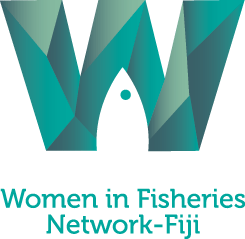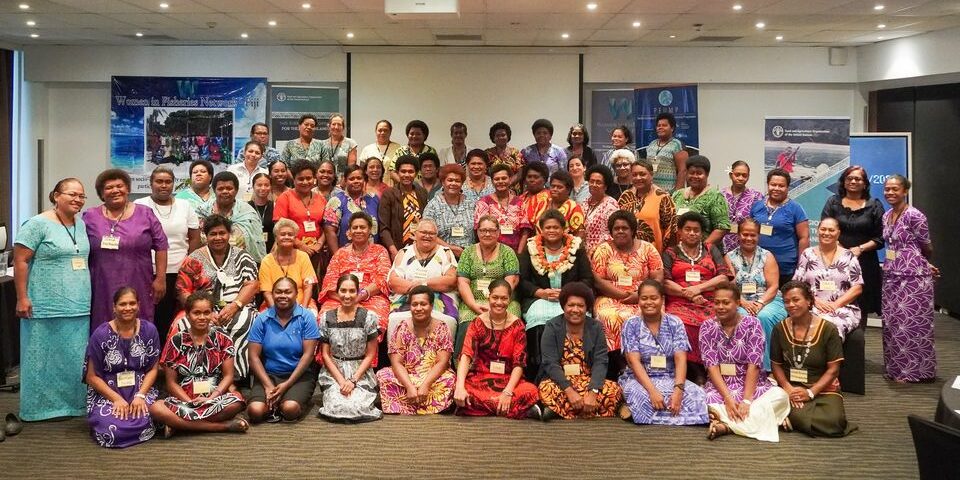
The Women in Fisheries Network Fiji with joint support from partner organizations is calling for action to raise the voices of women in fisheries to be heard by national agencies and development partners.
Global agreements and internationally recognized guidelines that Fiji has ratified have strong calls for gender equity in all fisheries matters. This includes equitable benefits from the blue economy and inclusive decision-making on marine resource use and management.
More than 37 women fishers and fish workers and 46 individuals from partner organizations attended the Women in Fisheries Forum Fiji held in Suva on the 13th and 14th of March 2023 in celebration of International Women’s Day. These participants shared their perspectives and experiences under four themes:
Theme 1: Joining men at the blue economy table – Let’s boost equity for a sustainable future.
Theme 2: Valuing fisher women’s indigenous knowledge and resource management practices for community and national well-being.
Theme 3: Challenging governance structures – Let’s hear it from the women fishers and fish workers.
Theme 4: Pandemics, disasters, and shocks – Women leading the way with resilience and innovation.
Key messages were distilled from the presentations and sharing of lessons under these themes:
- Availability of gender-disaggregated data to inform policy and service delivery: A lack of disaggregated data in formalized national statistics systems was highlighted. The Ministry of Women, Children, and Poverty Alleviation-led Gender Transformative Institutional Capacity Development Initiative (2022) provides the latest rapid gender analysis of the fisheries sector confirming that women account for 51% of inshore fishers and 94% of freshwater fishers while 43% of Fijian women who fish do so for a source of income and 99% to provide food. Communal contributions from their fishing activities are also high with 64% of women providing food for cultural events. Yet these contributions remain invisible because they are not included in official statistics.
- Navigating through shocks, pandemics, and disasters: Fijian women play a critical role as resilient safety nets for their families, communities, and the nation by collecting and preparing aquatic resources to sell in strings, baskets, buckets, ice cream containers or sacks, along roadsides or on weekends at municipal markets with sleeping infants and children on their arms. Nevertheless, their efforts are often not recognized. In the fisheries sector, if women’s catches are not counted this means their contributions are taken for granted and can be expected to be given little consideration in disaster recovery responses.
- Women fishers and fish workers have long been part of the Blue Economy: Their expanded roles in fisheries stretch across a wide spectrum of pre-to post-harvest, selling and value-adding while bargaining, transporting, and marketing their produce. Women shared their experiences of being self-organizers. They find ways to connect to markets and transport their produce from rural to urban areas. They build networks to organize themselves in an attempt to use their collective voices to shift bargaining power or overcome rigid and discriminatory governance structures.
- Traditional Knowledge: Many examples of women’s explicit traditional knowledge were shared in the Forum, including the use of ecosystem services including food, medicine, and handicrafts, and of the intimate connections between activities on land and the quality of the marine environment. Women’s traditional environmental knowledge of marine and connecting terrestrial ecosystems and their refined fishing skills can be fostered as part of the nation’s platform for generational knowledge exchange for a resilient future.
- Access to opportunities: It can be easier for people living in urban and semi-urban areas to access to development interventions than those in more remote rural areas. This disconnect was noted as a particular issue by rural women fisherfolks.
- A lack of access to information: was raised by women fishers and fish workers as a major stumbling block. This manifested in several ways:
- Processes and stakeholder channels to access support services were not well understood;
- Difficulties in partaking in community-based management activities and complying with marine resource management rules and regulations because of the lack of information and the lack of engagement in community-based fisheries management activities;
- Traditional governance regimes continue to marginalize women’s voices in decision-making processes and make access to information on marine resources often dependent on men with power in the community setting or existing cultural norms;
- Unrealistic expectations were sometimes raised when different messages about what could be expected from a project filtered through to the women who could be engaged in the project;
- A poor knowledge of how different pieces of legislation determine how coastal resources can be used (e.g., mangroves);
- Women who did not have the opportunity to attend easily accessible training miss out on core skills to enable them to engage equitably in the blue economy such as marketing and financial management capacity.
THE IMPORTANCE OF SEX-DISAGGREGATED DATA FOR INCLUSIVE AND EVIDENCE-INFORMED FISHERIES
We call upon policy and decision-makers and development partners to support the formalized collection of sex-disaggregated and socio-economic data that captures small-scale fisheries activities, and their gender dimensions.
THE ROLE OF FISHERWOMEN IN ADVOCACY AND LEADERSHIP AND ECONOMIC EMPOWERMENT OF WOMEN FISHERS AND MARKET FRONTLINES
We urge national agencies, the public, and the media to change the narrative of women fishers from vulnerable unseen, and unpaid helpers to market front liners, blue economy players, climate warriors, and above all, agents of change.
We request fisheries development initiatives to shift focus towards women-led fisheries and market development that starts at the rural level. In doing so, livelihood interventions should support rural women’s economic empowerment from the sea to the table, including value-adding support. This requires enabling women fisher’s cooperatives, investing in postharvest facilities, and upskilling opportunities to adjust to modern market demands.
ENABLING CONDITIONS TO INFLUENCE POLICY AND IMPROVE ACCESSIBILITY OF SERVICES
We call for enabling conditions that will influence policies that are gender-responsive; to make services more accessible to fisherwomen and all women involved across the fisheries value chain, with particular emphasis on women in rural areas where service accessibility remains a challenge.
VALUING FISHER WOMEN’S INDIGENOUS KNOWLEDGE AND RESOURCE
We encourage research initiatives that highlight women’s traditional environmental knowledge related to fishing, their role in intergenerational knowledge transfer and increased scientific knowledge on marine resources women dominantly use for food and income to inform fisheries management.
STRENGTHENING COLLECTIVE ACTION AND POSITIONING ON KEY GENDER EQUALITY ISSUES
We welcome increased efforts to engage men and boys at the household or mataqali level in fisheries development initiatives that support women. Fostering partnerships between women and women’s groups and the men and male-dominated governing community structures, nurturing understanding for each other’s roles and workloads, and enabling shared responsibilities and support for each other at the household and community level is a prerequisites to progress equality.
We call for information campaigns that target women fisherfolks in rural areas for increased understanding of fisheries matters, access to support services, redress, and grievance mechanisms or information on fisheries management and nature conservation matters.
We call for the support for our national network and the creation of a regional mechanism to provide opportunities to strengthen existing women fishers’ networks in the country and across the region and to link practitioners to researchers, planners, and those in decision making encouraging sharing of experiences and information, comparing and mutually reinforce working methods in Fiji and the region
This call for action is initiated by the WiFN Fiji and supported by partner organizations:

Link to Document: Collective call for action – Voices of Women in Fisheries in Fiji

